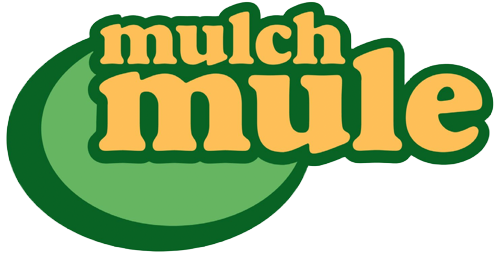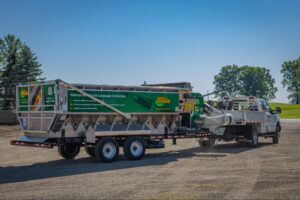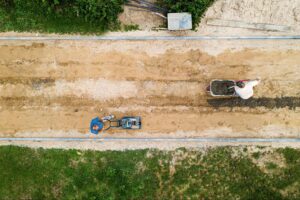Managing large-scale landscaping projects can quickly become overwhelming. Whether you’re transporting mulch, soil, or debris, the demands of efficiently moving and spreading materials are significant. Labor shortages, rising wages, and tight deadlines can further reduce productivity and compromise safety.
A bulk mulch equipment trailer offers a scalable solution to these challenges. Designed to streamline loading, transport, and unloading, such trailers reduce labor demands and boost overall efficiency. This guide provides essential considerations for selecting the right equipment for your business. We will discuss key features, sizing guidelines, safety protocols, seasonal versatility, and a head-to-head comparison of two leading models—Mulch Mule and Mulch Mate—so you can make an informed decision.
Key Features to Consider for Tackling Commercial Landscaping Challenges
When choosing a bulk mulch equipment trailer, focusing on features that enhance operational efficiency and safety is vital. Consider the following aspects:
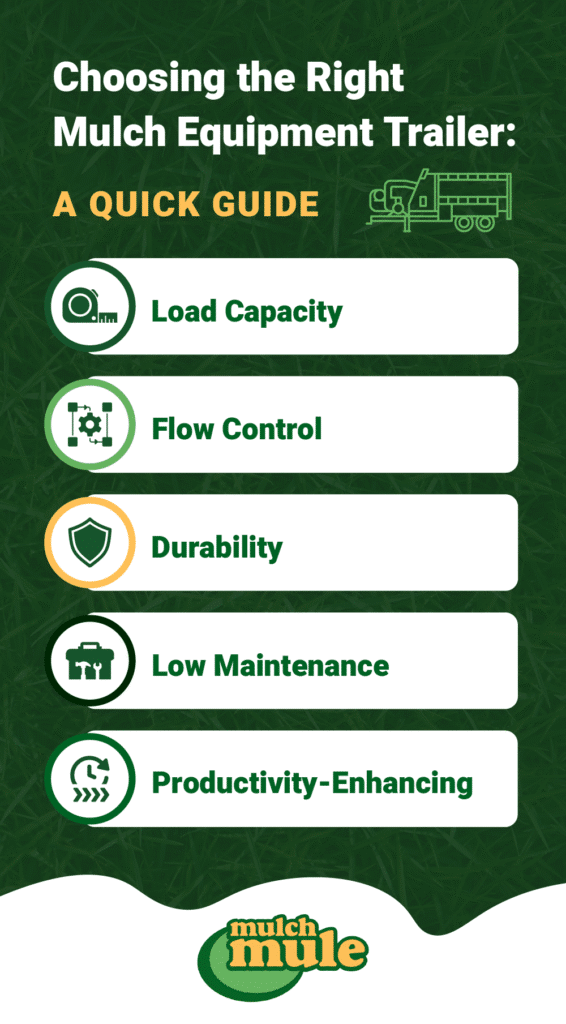
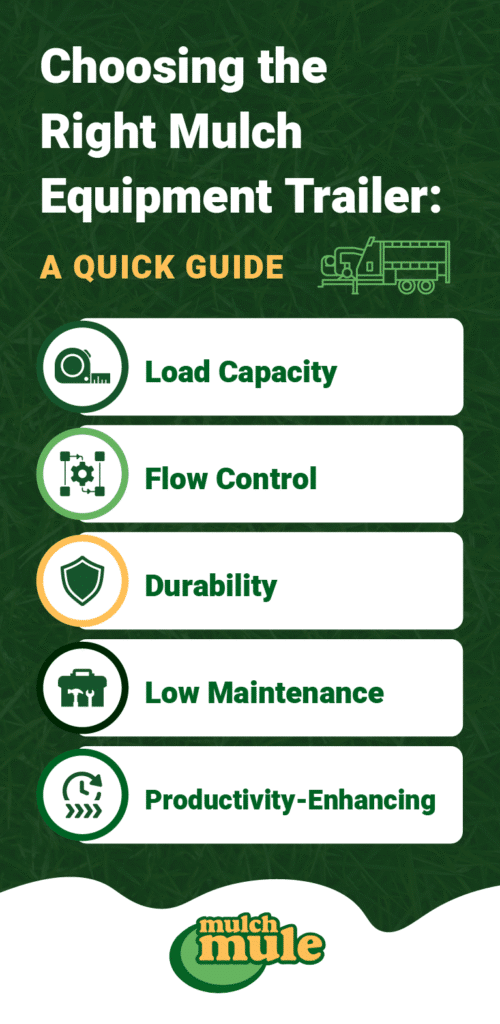
Load Capacity
The trailer’s hopper capacity directly influences how much material can be moved in one run. A 15-cubic yard aluminum hopper, for example, minimizes trips and keeps projects on schedule. Matching capacity to your typical project sizes ensures maximum efficiency.
Flow Control and Live Floor Systems
Advanced live floor systems enable precise control over material discharge. A reversible mechanism that smoothly moves material in both directions reduces spillage and manual intervention. This technology not only enhances safety but also speeds up the loading and unloading process. The live floor system is continuous, meaning no cleaning or resetting tarps between refills.
Durability and Construction Quality
Landscaping equipment endures harsh conditions. Look for trailers built with tubular steel frames, corrosion-resistant aluminum hoppers, and robust suspensions. Such durable construction reduces maintenance needs and ensures longevity, even in demanding environments.
PRO TIP: Inquire with the dealer or company about the warranty details on long-term coverage.
Low Maintenance and Simplicity
A low-maintenance design is crucial for keeping downtime to a minimum. Fewer moving parts, heavy duty components, and a streamlined layout—such as easy access to engine components and hydraulic systems—help reduce repair frequency and operating costs.
Productivity-Enhancing Features
Innovative features like front-positioned discharge chutes for better weight distribution and ergonomic designs that simplify material loading are essential. This means no trailer sway between job to job vs a rear-positioned discharge chute with leave weight behind the axles, potentially causing trailer-sway which is a safety issue.
These improvements not only boost efficiency but also enhance worker safety by reducing the physical strain associated with manual handling.
Sizing and Application Guidelines
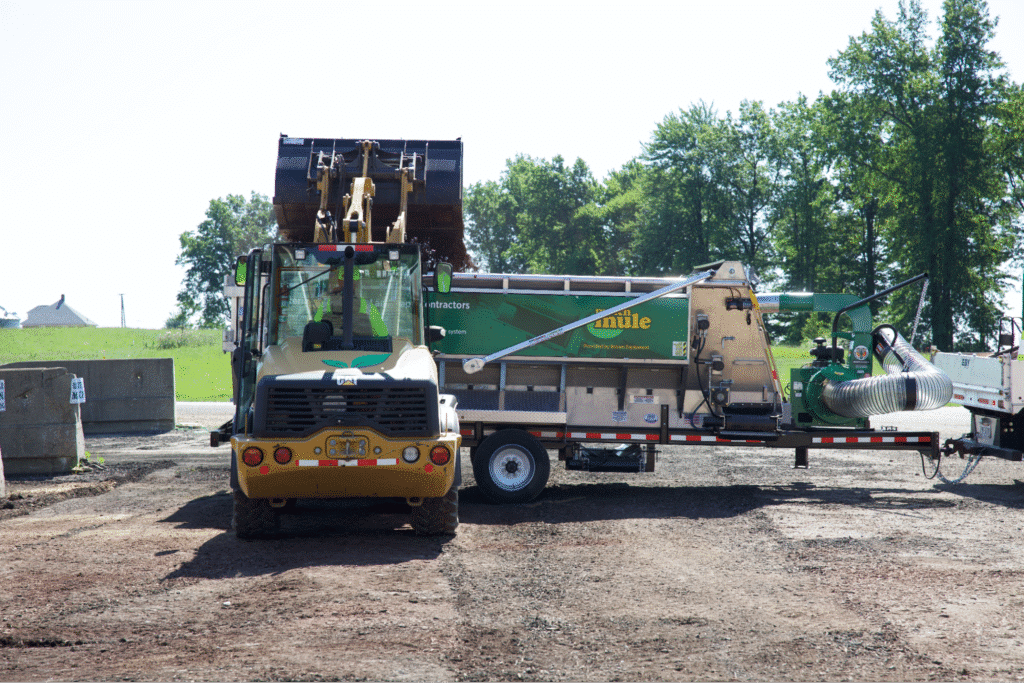
Selecting the appropriate trailer size is key to optimizing performance. When making your decision, consider the following factors:
- Project Scope: Evaluate the volume of material your projects typically require. For large operations, a 15-cubic yard capacity trailer minimizes trips and increases jobsite efficiency.
- Material Variability: Consider differences in the weight and texture of materials. Mulch is lighter compared to wet soil or gravel, so ensure the trailer can accommodate heavier loads without compromising performance.
- Job Site Accessibility: Urban sites or areas with tight access demand trailers with shorter wheelbases and tighter turning radii. Choose a model that offers maneuverability as well as capacity.
- Equipment Compatibility: Ensure the trailer works seamlessly with your existing machinery, such as loaders or skid steers. Compatibility reduces integration issues and improves operational flow.
By aligning trailer size with your project demands and site conditions, you can optimize productivity and work safely.
Regulatory and Safety Considerations
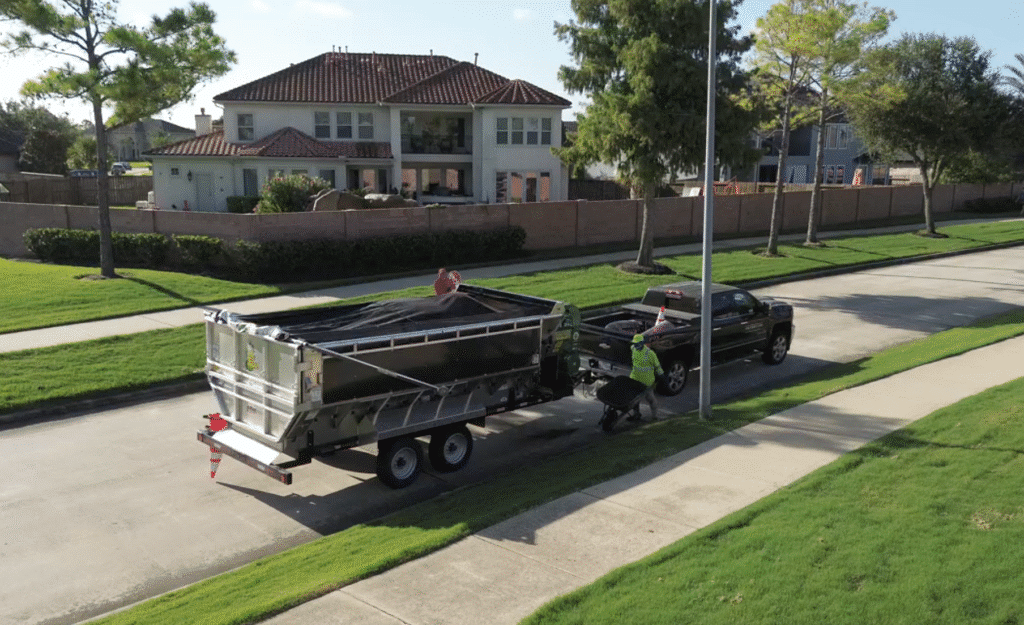
Compliance and safety are as important as performance when choosing a bulk mulch equipment trailer. Key aspects to focus on include:
DOT Compliance
Trailers must meet Department of Transportation requirements, which cover weight limits, lighting, braking systems, and registration. Find out more about DOT compliance for commercial vehicles. Equipment built to comply with these regulations reduces the risk of fines and ensures safe road use.
Safety-Enhancing Design
Features like balanced load distribution and secure discharge systems help maintain stability during transportation by eliminating trailer-sway. For example, Mulch Mule employs a forward discharge chute that integrates with its reversible live floor system to help maintain balance during transport.
Operator Training
Even the best equipment requires skilled handling. Review OSHA guidelines for operator safety training on proper loading techniques, operation of live floor systems, and safe unloading practices. Well-trained operators improve overall safety and efficiency.
Focusing on these areas not only protects your workforce but also minimizes operational disruptions related to safety issues.
Seasonal and Year-Round Applications
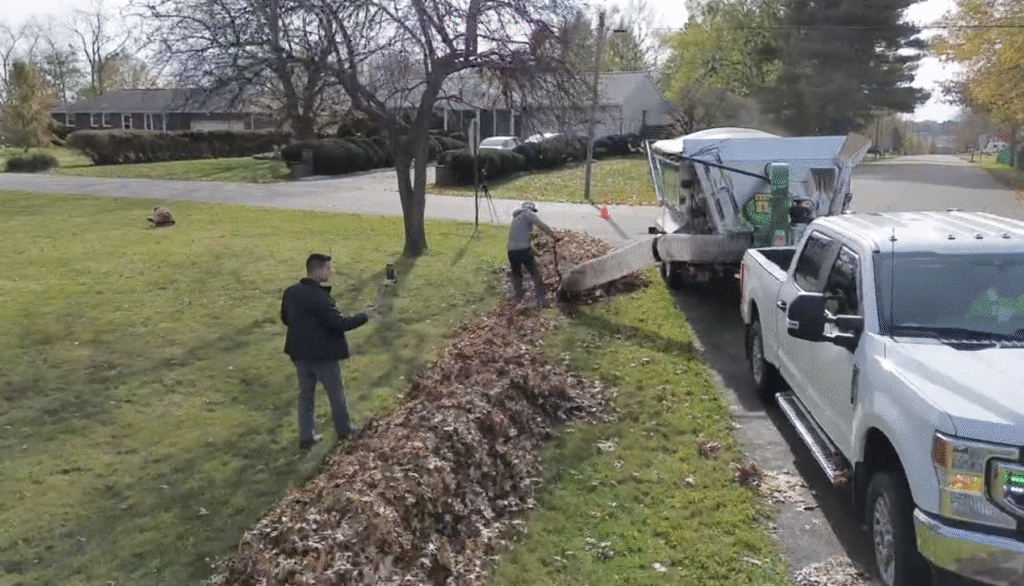
A versatile bulk mulch equipment trailer can serve your needs throughout the year. Consider these common applications:
- Spring and Summer: During peak landscaping seasons, trailers help with high-volume mulch delivery and soil spreading. Rapid discharge systems and large capacities allow teams to work faster and reduce labor costs.
- Autumn: Fall tasks such as leaf and debris cleanup benefit from attachments like debris vacuums. Efficient collection and distribution help keep properties well-maintained.
- Winter: Even when landscaping activity slows, trailers are useful for storm debris removal or hauling fill materials for winter construction projects.
- Construction Projects: Beyond landscaping, these trailers are effective for transporting gravel, sand, palletized material such as pavers, and other building aggregates, ensuring year-round utility.
Investing in a trailer that performs under various conditions maximizes your equipment’s value and supports business continuity.
Mulch Mule vs. Mulch Mate—Finding the Right Fit for Your Business
When choosing the right mulch equipment trailer, two of the most popular options are the Mulch Mule and the Mulch Mate. Both offer distinct features and benefits, and understanding those differences can help you determine which one is the best fit for your specific business needs.
Key Differentiators At-A-Glance
The Mulch Mule trailer is a more premium product, designed to be a long-term investment with decades of proven performance. It’s built for those who prioritize durability, longevity, and professional presentation. It’s purpose built from the ground up and pioneered this market segment nearly 30-years ago. Mulch Mules are also supported by a network of service centers for maintenance and support.
The Mulch Mate is a more cost-effective option that offers a solution for businesses with different budget considerations.
Head-to-Head Comparison
| Feature | Mulch Mule | Mulch Mate |
| Design | Purpose-built trailer | Modular, mounts on dump bodies |
| Construction | Tubular steel frame | I-beam construction |
| Discharge System | Continuous and Reversible live floor | Pull-tarp system |
| Hopper | Lightweight aluminum, 15 cu. yd. | Varies, uses existing dump body |
| Discharge Chute | Forward-facing | Rear-facing |
| Safety | Promotes balanced weight distribution | Requires care with weight shifts |
| Maintenance | Minimal (fluids/filters) | Higher (frequent tarp replacement) |
| Longevity | Up to 20 years on average | Varies, depends on maintenance |
| Resale Value | High, holds value well | Varies |
| Price | Higher up-front cost with long-term ROI | Cost-effective |
Design Philosophy & Construction
The Mulch Mule was created by a landscaping business owner to be a purpose-built material handling trailer. It features a streamlined design and a robust tubular steel frame engineered for durability, longevity, and a comfortable towing experience.
In contrast, the Mulch Mate is designed to be a modular system that mounts onto existing dump bodies. It uses an I-beam construction and offers a different approach to material handling.
Material Discharge System
A key difference between the two trailers is how they discharge materials. The Mulch Mule uses a continuous, reversible live floor system that can move materials in both directions, making it highly versatile for loading and unloading a variety of materials, including pallets and shrubs.
The Mulch Mate utilizes a tarp system to pull material to a rear discharge chute. This system is efficient for moving bulk materials but requires manual tarp resetting between loads.
Weight Distribution and Safety
The Mulch Mule’s forward-facing discharge chute is designed to maintain balanced weight distribution, which can enhance stability during transport, especially with partial loads.
The Mulch Mate’s rear discharge chute shifts weight behind the axle as it unloads, and some users may need to take additional care during operation to manage this change in balance.
Maintenance & Longevity
The Mulch Mule’s simple design and minimal consumables—just fluids and filters for a simple 13-hp Honda engine—make it a low-maintenance option. The system avoids using tarps, which can be prone to tearing and require replacement, potentially leading to downtime. Mulch Mule’s construction is built for longevity, with units routinely providing a service life of around 20 years.
The Mulch Mate’s tarp-based system may require users to keep spare tarps on hand, which can add to long-term operational costs.
Resale Value & Professional Appearance
Due to its proven durability and long lifespan, the Mulch Mule has a reputation for retaining its value well, with older used units often selling quickly and for a significant price. The Mulch Mule also has a sleek, polished appearance, offering ample surface area for branding and serving as a professional rolling billboard for your business.
The Mulch Mate, while effective, has a different design that may be seen as more utilitarian.
Ultimately, both the Mulch Mule and Mulch Mate are designed to help landscapers work more efficiently. Your decision will depend on your budget, your priorities regarding durability and maintenance, and the specific needs of your business. If you’re looking for a long-term investment with premium features, longevity, and a strong professional aesthetic, the Mulch Mule may be the right choice.
The Mulch Mule trailer is strategically designed by a landscaper, for landscapers for seamless transport and distribution of soil, mulch, leaves, debris, stone and aggregate. Many satisfied customers have seen measurable results with Mulch Mule. Watch the video below to learn why landscaping businesses owners who use this innovative piece of equipment say it’s the most durable, versatile and efficient piece of equipment for landscaping.
To see how other Mulch Mule users have benefited from the trailer and accessories, check out more video testimonials from real landscaping business owners explaining their experience with the trailer and how it’s impacted their team.
Factors to Evaluate in Determining the Total Cost of Ownership
Evaluating the total cost of ownership (TCO) involves more than just the initial purchase price. Consider these factors:
- Upfront Investment: Higher initial costs for premium models may be offset by fewer repairs and a longer lifespan.
- Maintenance Costs: A low-maintenance design reduces repair frequency and saves on downtime. Fewer consumable parts mean your trailer stays operational longer.
- Operational Efficiency: Faster material handling and reduced labor costs contribute to overall savings. Enhanced features allow your team to complete projects quickly, boosting profitability.
- Resale Value: Durable equipment retains better resale value. Investing in a model known for longevity can provide significant returns when upgrading or selling used units.
- Financing Options: Many providers offer flexible financing or leasing plans, making it easier to manage upfront costs while gaining immediate efficiency benefits.
A careful assessment of TCO ensures that you choose a trailer that offers both immediate and long-term value.
Optimizing Implementation and Integration of a Bulk Mulch Equipment Trailer
Implementing a new bulk mulch equipment trailer successfully involves a few best practices. Start by planning for proper integration with your current fleet and scheduling operator training sessions. Additionally, regular maintenance checks and performance reviews can help identify early issues.
Transform Your Operations with the Right Solution for Your Needs

Selecting the right bulk mulch equipment trailer is a strategic decision that can transform your landscaping operations. By focusing on key features like load capacity, advanced flow control, durable construction, and low maintenance, you set your business up for greater efficiency and safety. The innovative Mulch Mule trailer stands out for its purpose-built design and long-term value—but the decision on which is right for you really depends on the need and your applications. A Mulch Mule representative will gladly provide guidance on if the Mulch Mule is truly a fit for meeting your needs..
If you’re ready to optimize your projects, reduce labor costs, and enhance safety on the jobsite, consider experiencing the benefits firsthand. Schedule a live demonstration or request a personalized quote to see how this innovative solution can work for your business. Take the next step toward a more efficient and profitable future with the right equipment—invest in a system that truly works as hard as you do.
